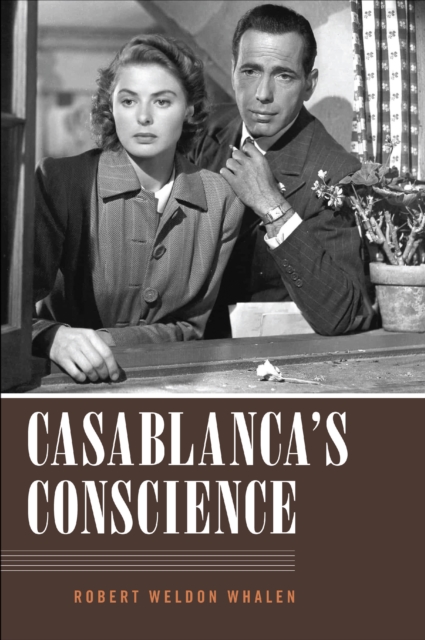Casablanca's Conscience

Casablanca's Conscience
A new look at a beloved classic film that explores the philosophical dynamics of Casablanca
Celebrating its eightieth anniversary this year, Casablanca remains one of the world's most endur-ingly favorite movies. It won three Academy Awards for Best Picture, Best Director, and Best Adapted Screenplay. It is still commonly quoted: "We'll always have Paris" and "Here's looking at you, kid" And who can forget, "You must remember this...a kiss is just a kiss." Yet no one expected much to come of this little film, certainly not its blockbuster stars or even the studio producing it. So how did this hastily cranked-out 1940s film, despite its many limitations, become one of the greatest films ever made? How is it that year after year, decade after decade, it continues to appear in the lists of the greatest movies ever produced? And why do audiences still weep when Rick and Ilsa part? The answer, according to Casablanca's Conscience, is to paraphrase Rick, "It's true." Much has already been written about the film and the career-defining performances of Bogart and Bergman. Casablanca is an epic tale of love, betrayal, and sacrifice set against the backdrop of World War II. Yet decades later, it continues to capture the imagination of filmgoers. In Casablanca's Conscience, author Robert Weldon Whalen explains why it still resonates so deeply. Applying a new lens to an old classic, Whalen focuses on the film's timeless themes--Exile, Purgatory, Irony, Love, Resistance, and Memory. He then engages the fictional characters--Rick, Ilsa, and the others--against the philosophical and theological discourse of their real contemporaries, Hannah Arendt, Dietrich Bonhoeffer, and Albert Camus. The relationships between fictional and histori-cal persons illuminate both the film's era as well as perennial human concerns. Both the film and the work of the philosophers explore dimensions of the human experience, which, while extreme, are familiar to everyone. It's the themes that resonate with the viewer, that have sustained it as an evergreen classic all these years.PRP: 184.72 Lei
Acesta este Prețul Recomandat de Producător. Prețul de vânzare al produsului este afișat mai jos.
166.25Lei
166.25Lei
184.72 LeiLivrare in 2-4 saptamani
Descrierea produsului
A new look at a beloved classic film that explores the philosophical dynamics of Casablanca
Celebrating its eightieth anniversary this year, Casablanca remains one of the world's most endur-ingly favorite movies. It won three Academy Awards for Best Picture, Best Director, and Best Adapted Screenplay. It is still commonly quoted: "We'll always have Paris" and "Here's looking at you, kid" And who can forget, "You must remember this...a kiss is just a kiss." Yet no one expected much to come of this little film, certainly not its blockbuster stars or even the studio producing it. So how did this hastily cranked-out 1940s film, despite its many limitations, become one of the greatest films ever made? How is it that year after year, decade after decade, it continues to appear in the lists of the greatest movies ever produced? And why do audiences still weep when Rick and Ilsa part? The answer, according to Casablanca's Conscience, is to paraphrase Rick, "It's true." Much has already been written about the film and the career-defining performances of Bogart and Bergman. Casablanca is an epic tale of love, betrayal, and sacrifice set against the backdrop of World War II. Yet decades later, it continues to capture the imagination of filmgoers. In Casablanca's Conscience, author Robert Weldon Whalen explains why it still resonates so deeply. Applying a new lens to an old classic, Whalen focuses on the film's timeless themes--Exile, Purgatory, Irony, Love, Resistance, and Memory. He then engages the fictional characters--Rick, Ilsa, and the others--against the philosophical and theological discourse of their real contemporaries, Hannah Arendt, Dietrich Bonhoeffer, and Albert Camus. The relationships between fictional and histori-cal persons illuminate both the film's era as well as perennial human concerns. Both the film and the work of the philosophers explore dimensions of the human experience, which, while extreme, are familiar to everyone. It's the themes that resonate with the viewer, that have sustained it as an evergreen classic all these years.Detaliile produsului










